More than half of Americans admitted to postponing a major life decision, such as enrolling in higher education, retiring or starting a family, because of financial reasons, according to a new poll from the American Institute of CPAs.
The survey of 1,010 adults, conducted by phone for the AICPA by Harris Poll in March, asked about a number of specific life events. It found the percentage of Americans delaying them for financial reasons have more than doubled since a similar survey in 2007.
Those events include higher education (24 percent delaying in 2015, compared to 11 percent in 2007), buying a home (22 percent delaying in 2015, compared to 14 percent in 2007), medical procedure (19 percent delaying in 2015, compared to 9 percent in 2007), retirement (18 percent delaying in 2015, compared to 9 percent in 2007), having children (13 percent delaying in 2015, compared to 5 percent in 2007), and marriage (12 percent delaying in 2015, compared to 6 percent in 2007).
“When making major life decisions like buying a home or getting married, it’s crucial that you consider both the short and long-term financial implications,” said Ernie Almonte, chairman of the AICPA’s National CPA Financial Literacy Commission, in a statement. “If you don’t have adequate savings in place or you’re having trouble paying your bills, it may make sense to hold off on major life decisions until you’re on more solid financial footing.”
For those delaying these major life decisions, the primary reason given was a lack of savings, cited by 60 percent of those polled. This was followed by concerns about the U.S. economy (50 percent), difficulty paying non-mortgage monthly bills (39 percent) and medical bills (29 percent).
Other reasons people say they are delaying life decisions are a need to take care of elderly parents or other relatives (29 percent), pay down credit card debt (28 percent), as well as concerns about losing their job (27 percent) and difficulty making mortgage payments (25 percent).
On the positive side, the survey found that a vast majority (85 percent) of Americans report having made positive changes to their financial behavior since the recession. That includes following a monthly budget (58 percent), increasing their savings rate (44 percent) or adding to an emergency fund (35 percent)—among other things.
For more information on financial planning, visit the
[IMGCAP(1)]





